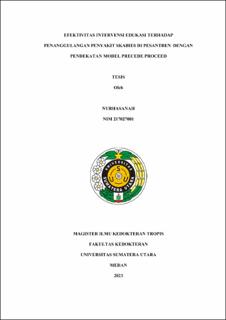| dc.description.abstract | Introduction : Scabies is an infectious disease that is often found in densely
populated conditions and young age such as in students in Islamic boarding schools.
Handling scabies in pesantren is not only enough to see students as scabies sufferers
but also to review the management. The Precede Proced Model (PPM) is a framework
for designing health programs for individual and organizational behavior change, and
can be evaluated. Educational programs are learning experiences designed to
influence, enable and encourage (predisposing, enabiling and reinforcing) conscious
actions that are conducive to the management of scabies disease in pesantren.
Objective : This study was designed to see if education can make changes to the
predisposing, enabling and reinforcing variables
Method: Quasi Experimental Pretest and postest Design study in May-August 2023.
Primary data collection in the form of validating questionnaires was carried out on 70
students and 30 managers of intervention groups in pesantren A and 70 students and
30 groups of control group managers in pesantren I. with a total sample of 140
students and 60 managers. Clinical examination of scabies with IACS 2020 criteria
was carried out on 140 students, and microscopic examination of skin scrapings on
students suffering from scabies as many as 48 samples. Data was analyzed with SPSS
ver 25.
Results: The subjects of the study were male students greater than women, namely
57.1% in the intervention group and 54.3% in the control group , while in the
managers most of the women were 60% of the intervention group and 73.3% of the
control group. The prevalence of scabies clinically in the intervention group students
was 38.6% and 35.7% in the control group and only two of the skin scraping samples
contained scabies. There was a significant increase in knowledge before and after
education (p; 0.001) both for students and managers. However, education does not
have a significant effect on beliefs, attitudes, perceptions, values, enabling and
reinforcing.
Conclusion : Education effectively increases the knowledge of students and managers
of scabies. | en_US |





